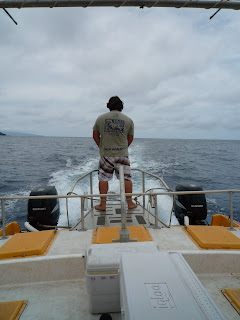 When I was on Maui last month for the Wa'a Kiakahi sailing canoe race, another journalist riding on the escort boat turned to me after riding the waves for several miles, and said of the boat crew, "They're speaking a dialect I don't understand."
When I was on Maui last month for the Wa'a Kiakahi sailing canoe race, another journalist riding on the escort boat turned to me after riding the waves for several miles, and said of the boat crew, "They're speaking a dialect I don't understand.""That's Pidgin," said I, which contributed nothing to her understanding. "O-o-o-kay," she said, "but what language is it?"
"English!" I answered, while wondering what da kine journalist she was supposed to be.
"Have you noticed the frequency of the expression 'da kine'?" I asked. She nodded. Oh yeah. Like every other word. I told her it meant "uh," "er," "whatchamacallit," "whatever," or, well, whatever.
To be honest, I'm rather new at Pidgin myself, and most of what the escort boat crew said was Greek to me. Didn't understand them, but appreciated the good work they did watching out for
 the paddlers' safety and towing the stragglers, as pictured to the left.
the paddlers' safety and towing the stragglers, as pictured to the left.So, with happy memories of riding on that boat with the cheerful crew (especially Gully Boy -- I still got yo numbah, you buggah!), I decided to talk about Pidgin for my Fun Fact at hula class this week.
Like everything else I've been learning about Hawaiian culture, it turned out to be pretty interesting. Pidgin, which is more properly called Hawaiian English Creole according to the linguists, had its beginnings in the late 1700s with the introduction of Chinese Pidgin, which English and American traders used when selling their cargos of furs in Canton. The sugar cane and pineapple plantations were established in the early 1800s and workers came from all over the world. The common language the workers devised had elements of Chinese, Japanese, Korean, Portuguese, Spanish and Tagalog, the language of the Philippines.
Pidgin gained strength as a language after the New England missionaries imposed their English-only rule in the 1870s. By the 1920s, Pidgin was the dominant language in the Hawaiian Islands.

It's still prevalent, a hodge-podge of languages with an English base. The grammatical constructions actually come from Portuguese, but there are words from all the contributing cultures.
There are Pidgin grammars and dictionaries available, such as "Pidgin To Da Max," and "Da Kine Dictionary." Novelists, poets and playwrights compose in Pidgin. I've read some of the Pidgin writings of Hilo poet and novelist Lois-Ann Yamanaka.
The New Testament has been tranlated into Pidgin. It's called "Da Jesus Book." Even Shakespeare got the treatment. His play, "Twelfth Night or What You Will," has a Pidgin equivalent that has been produced on Hawaiian stages: "Twelf Night o' Whateva."
There are those language snobs and educators who believe Pidgin speakers are handicapped. But I say, don't go pullin' another missionary thing and try banning Pidgin. Hawaiian nearly died out because of such meddling. Personally, I love to hear spoken Pidgin. Riding in the escort boat with the cheerful crew was a delight. Couldn't understand what the hell they were talking about, but maybe dat's mo bettah, yeah?

No comments:
Post a Comment